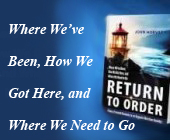By Haven Bradford Gow.
 In his work Return to Order, Catholic scholar John Horvat II provides a critique of the atomistic individualism that ruptures the social bonds that make civilized social life possible; he says this destructive kind of individualism sets forth “a philosophy of life that declares self-preservation and its corollary self-interest to be the most common and inalienable of all rights and the root of all morality and justice.” According to this view, “we are all involved in our own inebriating pursuit of self-interest… [The individual] is the ultimate judge of what is right and wrong… This concept holds that an individual becomes a perfect and complete being when ‘unencumbered’ by strong ties to tradition, family, custom, or moral law.”
In his work Return to Order, Catholic scholar John Horvat II provides a critique of the atomistic individualism that ruptures the social bonds that make civilized social life possible; he says this destructive kind of individualism sets forth “a philosophy of life that declares self-preservation and its corollary self-interest to be the most common and inalienable of all rights and the root of all morality and justice.” According to this view, “we are all involved in our own inebriating pursuit of self-interest… [The individual] is the ultimate judge of what is right and wrong… This concept holds that an individual becomes a perfect and complete being when ‘unencumbered’ by strong ties to tradition, family, custom, or moral law.”
These observations reminded me of the late scholar/educator Wilson Carey McWilliams and his book The Idea of Fraternity in America (U. of CA Press). According to Prof. McWilliams, although we have had a strong religious tradition in our own country, our public institutions have been based upon the assumptions and theories of the liberal Enlightenment. Our social, economic and political systems contain “a bias toward individualism, a hostility to communities, an assumption that material well-being and technological advances are in the high interests of man.” The liberal, Lockean tradition proposed to discard fraternity as a necessary means to human development and as a norm in everyday social and political life. Indeed, that tradition shunted aside the belief that man is a social and political animal who requires civic relations for his perfection. With the erosion of commitment to the old religious tradition, said Prof. McWilliams, the liberal tradition and its stress on a competitive ethos, its concern for material power and its atomistic individualism have come to permeate all aspects of American life with disastrous consequences; one such consequence is the sense of isolation – social and spiritual – felt by increasing numbers of Americans.
Implicit in the atomistic individualism that John Horvat and Wilson Carey McWilliams reject is the assumption that society is artificial. From the liberal, Lockean perspective, man enters society out of fear and greed; man enters society simply as a means of self-preservation. Society, at best, is a necessary evil. In sharp contrast to this view of social life is St. Thomas’ view that society is natural, that it arises from the intense and persistent demands of man’s higher nature. Man has natural inclinations toward social life; he enters society to share friendship, love, knowledge and pursuit of the common good.
John Horvat’s Return to Order restates St. Thomas’ much needed view of man and society.
[like url=https://www.facebook.com/ReturnToOrder.org]
Haven Bradford Gow is a teacher, writer, columnist and contributing editor as well as a television and radio commentator. He hails from Greenville, Mississippi.


